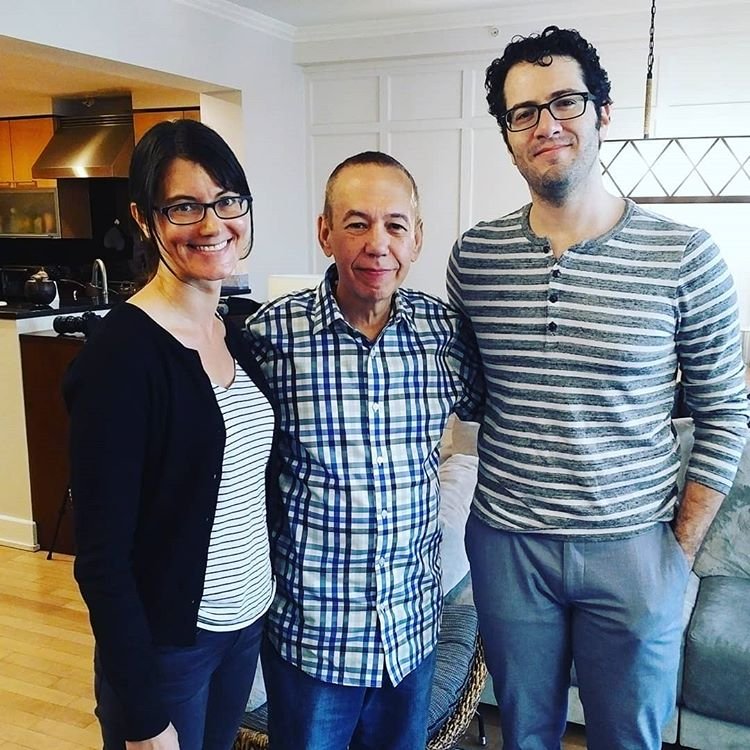Alum Nick Scown on his new film 'Too Soon: Comedy After 9/11'
(image courtesy of ViceTV)
On September 26, 2001, satirical newspaper The Onion released their first-ever New York issue. It also happened to be the first issue released after the events of September 11.
Many of the headlines from this issue have had a lasting effect in American culture, and it’s likely that you’ve seen them before— perhaps “Not Knowing What Else To Do, Woman Bakes American-Flag Cake” or “American Life Turns Into Bad Jerry Bruckheimer Movie.” For alum Nick Fituri Scown, those headlines left a deep impression: “The first time I laughed and felt something other than depression [after the attacks] was The Onion’s 9/11 issue.”
Scown’s new film, Too Soon: Comedy after 9/11, premieres tonight on VICE TV. Co-directed with award-winning comedy journalist Julie Seabaugh, the film explores the sudden halt and triumphant rebirth of comedy following the cataclysmic events of 9/11. The film has been Scown’s labor of love for the last five years, though he’d had the idea long before. “[I] didn’t know what to do with it,” he said. “I hadn’t made a documentary since the University of Utah.”
Scown graduated from the U in 2002, and fondly remembers his time in Utah, which he says was made particularly interesting by the media world’s transition from film to digital. Through classes he took from professors Brian Patrick and Kevin Hanson, his education created a valuable foundation which he still refers to. For example, screenwriting professor Paul Larsen’s refrain of “keep it interesting!” has been a guiding factor throughout Scown’s career. Following the U, Scown went on to receive on MFA from the University of Miami, and he says it was the U’s emphasis on story that prepared him for graduate school.
For Too Soon, the story began with the 9/11 issue of The Onion and Scown’s feeling that exploring humor after tragedy would make a great documentary. For a long time he assumed that someone “more qualified” would make such a film… but they didn’t. And so when he was flipping through a career advice book, and that book prompted him to email five people who could help him with his dream project, Nick emailed journalist Julie Seabaugh, whom he had met at a wedding. “I have this idea,” he wrote. “Can I buy you lunch?”
Nick Fituri Scown at the Comedy Cellar (Courtesy of Julie Seabaugh)
Finding collaborators is something Scown believes in, and he said that it was crucial for him to maintain a cohort of fellow filmmakers as he made the transition from student to filmmaker. “Don’t go it alone,” he said, and encouraged students to keep in touch with their classmates and coworkers, even people met in passing at events and festivals. These are the people who will make films with you, get each other jobs, and become valuable industry contacts.
At their lunch, Scown told Seabaugh about The Onion issue, and she told him how she had kept that very issue with her as inspiration while she traveled the nation for her journalism career. Having this bonding point, they decided to simply get started. Seabaugh called in some favors to set up interviews, Scown borrowed film equipment from his roommate, and together they headed off to the Just For Laughs comedy festival in Montreal.
Thinking of how he and his co-director simply jumped into the project, Scown remembered an event he attended at the University of Utah when he was a student where filmmaker Werner Herzog was the guest speaker. “One of the things he said was that people are more apt to help with a project that’s already in progress than to help launch something,” Scown said. Using this as a guiding principle, he took the footage collected in Montreal and made a “trailer” for his potential film, which he and Seabaugh then used as a proof-of-concept to pitch to production companies, distributors, and potential interview subjects.
Julie Seabaugh and Nick Fituri Scown with Gilbert Gottfried (Courtesy of Too Soon Productions)
With this trailer, the film began to grow, Scown collected more and more stories of humor after 9/11, and the film began to take shape. One of the sections of the film that Scown feels most passionate about features Muslim comics and comics of Middle-Eastern and South-Asian descent. As anti-
Muslim backlash became a crisis in the wake of the 9/11 attacks, many comics found that they were drawn into political comedy even when they didn’t want to be. The film features comics such as Negin Farsad and Hari Kondabolu, who have both used comedy to draw attention racism and other societal issues. While on stage, Scown said, these comics found “power in being able to control the narrative.” He observed that comedy can more easily break through dominant narratives— something that Farsad calls “the power of the little chuckle.” With laughter involved, defensiveness can take a backseat to empathy.
Overall, what Scown wants to share with Too Soon is “humor’s ability to break the spell of depression and anxiety” and show how a comedian’s job “is to find light in the darkness.” As he was editing the film throughout the course of the pandemic, Scown observed people flocking to comedy again. “In trying times, whatever terrible news is happening that day, it’s these comedians that we go to to help process that and try to take some of the power away from anger and frustration,” he said. “A lot of [comedy] is just people putting voice to our feelings.” With that in mind, he believes that, most of the time, it’s not too soon: “If we don’t talk about these things then they begin to fester.” And for students, he wants to remind them that it’s never too soon to start working on that passion project.
Too Soon: Comedy After 9/11 premieres on VICE TV on Wednesday, September 8th at 9:00pm ET. It will then be available to view on vicetv.com.
written by Merritt Mecham




